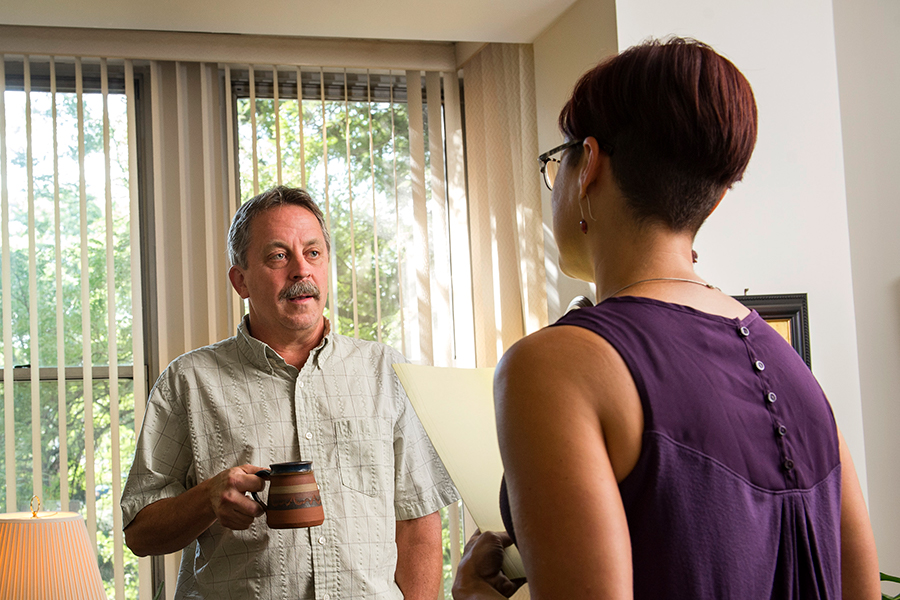I am a faculty or staff member concerned for a CMU student.
Consultation
During your time at CMU you may encounter a student who is going through a tough time or experiencing some kind of distress. We offer consultation services for staff, faculty, advisors, or administrators. Consultation can address such issues as campus and community services, referring a student to services, and intervening with a student in distress.
If you see a student in trouble, you can help. We encourage faculty and staff members to respond to problematic student behavior unless the behavior is threatening or violent. While a few students might not welcome being approached, it is always best to attempt to talk with the student about your concerns and offer help. Approaching a distressed student in a caring and supportive way very often helps the student open up and share their thoughts with you. By engaging in this way, you can help them identify where and how to get help.
The following is a list of distress indicators you might observe in students:
- Disruptive Behavior – student exhibiting inappropriate behavior in a classroom or public spaces.
- Observable Changes – distinct changes in academic performance, withdrawal from others, changes in class participation, crying, outbursts of anger, increased or decreased activity, and poor attendance are examples of significant behavioral changes.
- Physical Complaints – students who repeatedly report physical illness or symptoms may be experiencing psychological problems. A change in eating patterns, sleep disturbances, fatigue, stomach aches, and pain are some common complaints that may be related to psychological problems.
- Alcohol and Drug Abuse – coming to class or a meeting when intoxicated or high is a serious signal. It may become a problem that interferes with social, academic, and work functioning.
- Academic Problems – students who have a noticeable decline in their academic performance may be feeling overwhelmed with other areas of their lives. Some students come to classes with difficulty concentrating, completing assignments, or performing well on exams.
- Talking about Suicide – any instance in which a student talks or writes about suicide should be taken seriously. If you suspect a student might be thinking about suicide but aren’t sure, you should express your concern and ask them directly. Some examples of how to ask can be: "Have you thought about killing yourself?" or "Have you been thinking about suicide?" There is a myth that you will “plant” the idea of suicide in their head if you ask directly. It can actually be quite helpful to talk with someone openly about your concerns and your desire to help.If you become aware of a student who is considering suicide, please make an immediate referral to CaPS.
If a student is falling behind in your class, consider the possibility that he/she may be struggling with one or more of these concerns. Most CMU students do not struggle academically because they lack the necessary intellect. They may be in some kind of distress, which is impacting their academic performance. While this does not excuse them from meeting academic expectations, your patience and helpful intervention could make a big difference in their emotional well-being and academic success. In some cases, your student might benefit from a referral for professional help.
What to Do
Your expression of concern may provide students the motivation they need to seek appropriate help or services. CaPS is available for consultation with faculty and staff if you are concerned about a student, unsure of an appropriate intervention, or need help in locating the appropriate resources.
Here is a list of suggestions on how to respond to a student:
- Approach the student in a private setting, such as your office.
- Include a description of the problem behavior you are observing and the specific consequences you see.
- Remind the student that you are doing this out of genuine concern for him/her.
- Remain calm and approach the student with a caring and supportive tone.
- Listen carefully and encourage the student’s efforts to ask for help.
- Help the student develop an action plan that addresses the problem.
- Consider cultural differences that may be impacting the articulation of the issue, their expectations, and external pressures.
Staff and faculty may contact the Office of Residential Education , Office of the Dean of Students , or Student Support Resources so that the appropriate person may get involved to assist both you and the student.
Making the Referral
For most students, you can simply give them CaPS number or direct them to the 4th floor of the Highmark Center for Health, Wellness & Athletics.
If you are concerned about their motivation to follow through or you would like to share your concerns with the therapist, it may be helpful to call ahead to speak with the therapist and walk them over.
Crisis Support
If you feel that a student is in crisis, you can call CaPS (412-268-2922) or encourage the student to call themselves. The CaPS receptionist will take some initial information and route the call appropriately. If you call, we will likely attempt to talk with the student directly, if possible, and we will schedule a meeting with the student within an appropriate time frame. If you feel comfortable, you can walk them to CaPS during business hours if they are willing. If so, please call ahead to let us know you are coming.
If you think a student is in imminent danger to self or others or is acting aggressively or violently call:
If student is on campus, call CMU Police at 412-268-2323.
If student is off campus, call Pittsburgh Police at 911 (if calling from Pittsburgh area) or 412-255-2927 (if calling from out of town).
